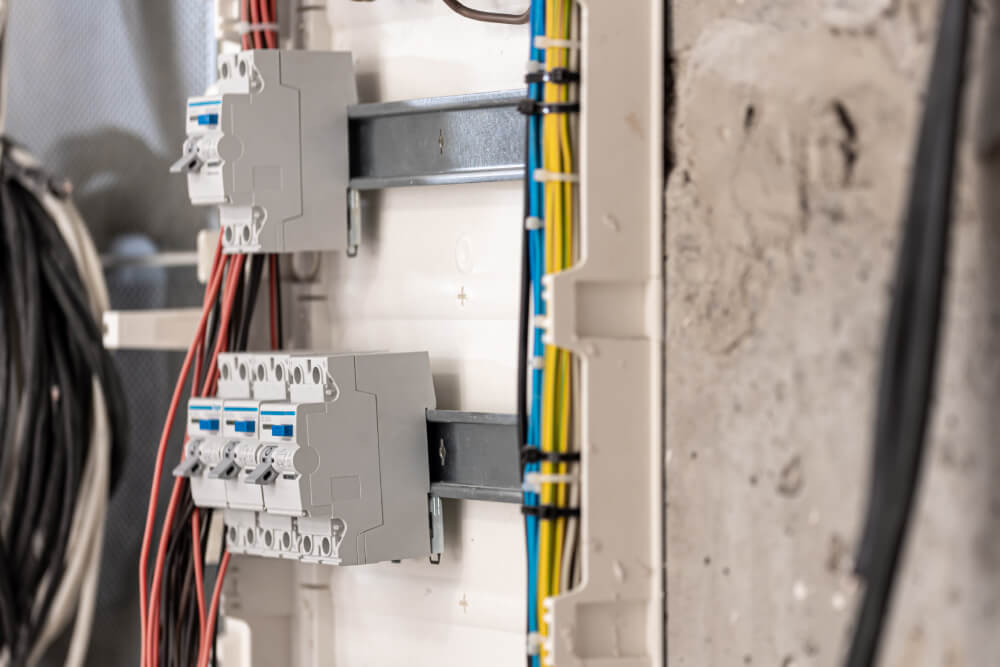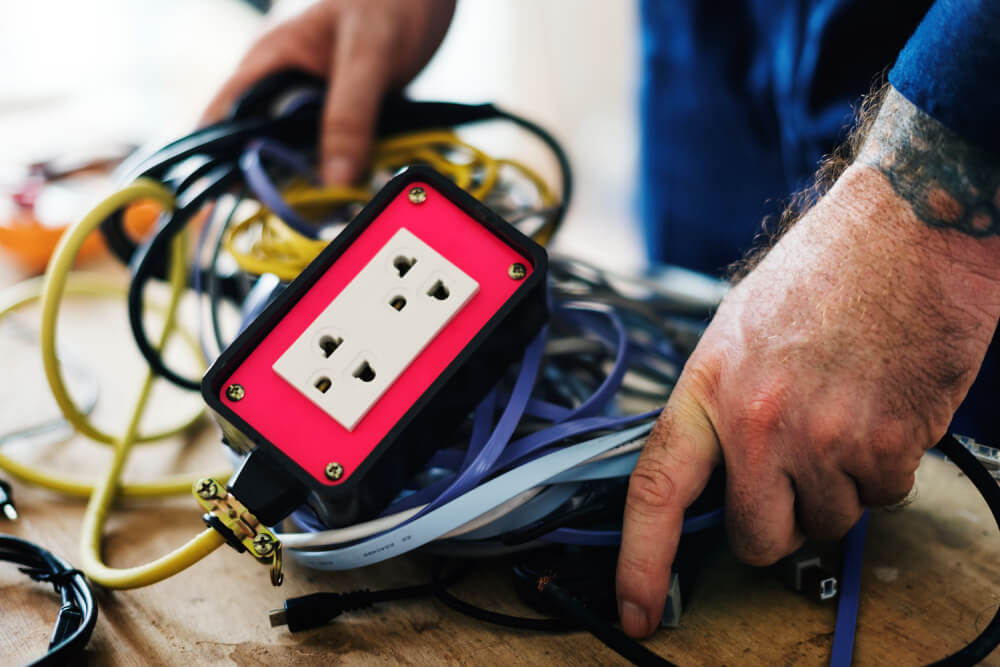Introduction
In addition to being frustrating, electrical issues in the house can be hazardous. Unfortunately, a lot of false information concerning electrical repairs is spread via myths and misconceptions. These misconceptions may influence homeowners to take actions that are risky or needlessly costly. We’ll dispel some of the most widespread misunderstandings about electrical repair in this post and provide practical advice to help you stay safe and knowledgeable when handling electrical problems in your house.
Myth 1: "Electrical Problems Always Require a Professional"
What is the myth?
Many homeowners believe that every electrical issue, no matter how minor, needs to be handled by a qualified electrician. Not all electrical problems are too complex for a do-it-yourselfer, but some do call for expert assistance.
Reality Check:
Homeowners with rudimentary electrical expertise can frequently tackle simple issues like changing a light switch, repairing a malfunctioning outlet, or resetting a tripped breaker. However, you should absolutely call a professional if you’re dealing with problems like exposed wires, circuit panel failures, or wiring in the walls.
Advice:
-
Start Small: If you’ve never done electrical work on your own before, start with easy fixes like changing a damaged outlet or switch.
-
Learn the Fundamentals: Numerous online tools and guides are available to help you troubleshoot little electrical problems.
- Know When to Hire a Professional: Hiring a professional is preferable to taking a chance on causing more damage or posing a safety danger if you’re ever unsure about the repair’s safety or intricacy.
Myth 2: "Flickering Lights Are Harmless"
What is the myth?
Many times, flickering lights are written off as a small annoyance. Homeowners could assume it’s just a momentary issue or an old lightbulb that will go away on its own.
Reality Check:
The truth is that flickering lights may indicate more serious electrical issues including loose connections, defective wiring, or an overloaded circuit. It can also be a sign of problems with the circuit breaker or your light fixture. Ignoring flickering lights could eventually result in more serious electrical concerns.
Advice:
- Check the Bulb: To rule out that easy cause, try changing the lightbulb first.
- Examine the Fixture: Look for any loose wiring or connections in the light fixture if changing the bulb doesn’t work.
- Make an Electrician Call: It’s recommended to get a qualified electrician to check your system and take care of any possible wiring or circuit problems if the flickering continues, especially across several lights or across the house.
Myth 3: "All Electrical Outlets Are the Same"
What is the myth?
Although it’s simple to believe that all electrical outlets are interchangeable, this is not the case. Depending on their location, design, and the electrical load they must support, outlets have a variety of uses.
Reality Check:
Not every channel is appropriate in every circumstance. Older homes, for instance, can contain ungrounding two-prong plugs, which are less secure than contemporary three-prong grounded outlets. To further minimize electrical shock in damp conditions, specialized outlets such as Ground Fault Circuit Interrupter (GFCI) outlets are to be placed in bathrooms, kitchens, garages, and outdoor spaces.
Advice:
- Upgrade Old Outlets: To increase safety and comply with current electrical standards, you should think about replacing your home’s antiquated two-prong outlets with three-prong ones.
- Install outlets with GFCIs: Install GFCI outlets—which instantly cut off electricity in the event of an electrical malfunction—in wet areas such as restrooms, kitchens, and outdoor areas.
- Regularly check the condition of the outlet: An outlet might need to be changed if it has scorch marks, buzzes, or feels warm to the touch.
Myth 4: "It’s Safe to Use Extension Cords as a Long-Term Solution"
What is the myth?
In places where there aren’t enough outlets, a lot of homes use extension cords to power equipment. Some people think that an extension cable is a long-term, safe solution as long as it is plugged in properly.
Reality Check:
Extension cords are useful in short-term scenarios, but they are not intended for long-term use. When extension cords are overloaded, they may overheat and start fires. Furthermore, cords can be damaged by being left under rugs or in high-traffic areas, which poses a shock risk.
Advice:
- Be Careful When Using Extension Cords: Don’t daisy-chain several cords together and only use extension cords for temporary purposes.
- Choose Outlets or Power Strips: To securely distribute the load if you require more outlets in a certain region, think about adding more outlets or utilizing a power strip with surge protection.
- Select Heavy-Duty Cords: Select an extension cord that is rated for the power load of the devices you are utilizing if you are forced to use one.
Myth 5: "Tripped Breakers Mean There's a Serious Problem"
What is the myth?
Many believe that a circuit breaker tripping indicates a major problem with the electrical system, including bad wiring or a malfunctioning electrical panel.
Reality Check:
In the event of a short circuit or system overload, circuit breakers are intended to trip as a protective measure. A tripped breaker indicates an electrical problem, but it’s not usually a serious one. Actually, it’s typically an indication that the system is functioning properly by averting fire or overheating.
Advice:
- Reset the Breaker: Just turn the breaker off and back on to reset it after determining and fixing the overload or problem.
- Seek the Root Cause: If the breaker keeps tripping, there can be a persistent issue, such bad wiring or a broken equipment. To identify and resolve the problem in this situation, you ought to contact an electrician.
- Check for Overload: The system may become overloaded if you have too many devices connected to a single circuit. To prevent more tripping, try moving gadgets to other outlets or circuits.
Myth 6: "If an Outlet Works, It’s Fine"
What is the myth?
It must be safe if an outlet is supplying electricity and your gadgets are operational. Because they don’t see any problems right away, many homeowners overlook possible problems with their outlets.
Reality Check:
Even if an outlet is still functional, it may eventually wear out or deteriorate. Sparks, overheating, or electrical shorts might result from loose connections or wiring problems in the outlet. Even if an outlet seems to be operating correctly, there could still be a significant safety concern.
Advice:
- Test Outlets Frequently: Make sure all outlets are functioning correctly by plugging in a gadget, such as a lamp or phone charger. Outlets may need to be replaced if you observe sporadic power or hot spots.
- Replace Faulty Outlets: As soon as feasible, replace any outlets that exhibit damage, such as looseness, discolouration, or scorch marks.
- Grounding Issues: Make sure all of your home’s outlets are grounded correctly to prevent electrical risks, particularly in the bathrooms and kitchens.
Myth 7: "Electrical Work Isn’t Dangerous If the Power Is Off"
What is the myth?
Many people assume that as long as they turn off the power at the breaker box, it’s safe to work on electrical wiring and components.
Reality Check:
There may remain residual voltage in the system even when the power is turned off, and handling electrical components incorrectly can result in electric shock. Even after turning off the breaker, it’s crucial to use a voltage tester to confirm that the electricity is totally off.
Advice:
- Use a Voltage Tester: Before touching any wires or outlets, be sure they are de-energized.
- Work with One Hand: To lower the chance of a lethal shock, always keep one hand in your pocket or behind your back when working on electrical equipment.
- Make a Professional Call: It is best to hire a certified electrician if you are unsure about how to do electrical work properly.
Myth 8: "DIY Electrical Work Will Save Money"
What is the myth?
In an effort to save money on expert labor, many homeowners try do-it-yourself electrical repairs. Although do-it-yourself projects might occasionally result in cost savings, they can also result in costly errors or even hazardous circumstances.
Reality Check:
Electrical repairs call for the right equipment and expertise. Improper installations or repairs may result in additional damage, raising the expense of repairs or posing a risk to the safety of the house. DIY electrical projects may also violate local construction rules or cancel insurance policies, which could result in expensive fines or hold up the sale of the house.
Advice:
- Know Your Limits: To prevent expensive errors, it is best to hire a professional to do electrical work if you lack the confidence to do so.
- Employ a Qualified Electrician: Hiring a professional electrician who can guarantee that the repair is done safely and in accordance with code is worthwhile for bigger or more complicated electrical problems.
- Think About Long-Term Expenses: Sometimes, by averting future problems, paying a bit extra up front for a competent repair can save you money later.
Myth 9: "Electricians Are Always Expensive"
What is the myth?
The idea that it’s always less expensive to fix electrical issues yourself rather than calling an electrician is a prevalent misconception. Homeowners frequently choose to troubleshoot or fix electrical problems themselves rather than seek professional assistance because they believe that electricians charge exorbitant prices for simple jobs.
Reality Check:
Many minor repairs are surprisingly inexpensive, even though some electricians may charge more for emergency or after-hours work. A qualified electrician can safely and swiftly fix problems, frequently saving you money by avoiding expensive do-it-yourself errors or damage. Hiring a qualified electrician guarantees safety, code compliance, and long-term cost savings, but doing electrical work yourself can be risky and result in larger, more costly issues.
Advice:
- Obtain Several Estimates: Do not be afraid to get quotes from a number of electricians if you are worried about the price. For simple tasks, many electricians provide free estimates so you may evaluate costs and services.
- Be Open About the Issue: Clearly state the problem’s symptoms when you contact an electrician. Their quote will be more accurate if you provide them more details. Simple jobs like repairing a light fixture or changing a broken outlet are usually not too expensive.
- Inquire about flat fees versus hourly rates: While some electricians bill by the hour, others charge a fixed rate for certain tasks. A flat-fee service can be more economical depending on the type of repair you need.
Why Electrical Code Violations Are a Serious Matter

Failing to adhere to electrical codes can have far-reaching consequences, including:
Insurance Issues:
Damages brought on by defective or non-compliant electrical installation are frequently not covered by homeowner’s insurance plans. You can be responsible for paying for all repairs and damages if an electrical fire or shock happens as a result of work that doesn’t adhere to code.
Having Trouble Selling Your House:
An inspection will be done if you intend to sell your house, and if there are any electrical code infractions, you could have to fix the system before the sale can proceed. This will not only slow down the process, but it may also make your property less valuable.
Safety Risks:
Safety is the most evident justification for following electrical codes. Inadequate installations frequently result in code violations because they expose wiring, cause problems with grounding, or put outlets or circuit breakers at risk of overheating. Hazards like electric shocks or flames could result from this.
Penalties and Legal Repercussions:
Electrical work without a permission is prohibited in some places, and doing so may result in penalties or other legal ramifications. Furthermore, you can be held legally responsible if someone is hurt as a result of your noncompliant work.
Tips for Ensuring Your Electrical Work Meets Code
Always Get Permits for Major job:
It’s crucial to get the right permits and have the job reviewed by a certified inspector if you intend to do any significant electrical work, such as adding circuits, rewiring your house, or installing a new electrical panel. This guarantees that the work is safe to use and up to code.
Recognize the Needs for an Electrician:
While not every electrical work necessitates a permit, it is nearly always required for large-scale jobs like upgrading your electrical panel, installing new outlets, or rewiring an entire house. Speak with a qualified electrician who can help you navigate the process if you’re not sure.
Employ Code-certified Materials:
When using cables, breakers, outlets, and switches in electrical projects, make sure they are UL-listed and certified. Strict safety and code standards are met by these materials, reducing the risk of fires and short circuits.
Don’t Take Shortcuts:
Refrain from taking “cut corners” when doing electrical work. To save time or money, don’t, for instance, utilize improper wiring or omit necessary measures like grounding circuits. Adhering to the code and making sure the work is done correctly is worth the expense.
Check for Updates to the NEC:
The National Electrical Code is updated regularly to account for new technologies, emerging safety concerns, and the ever-evolving demands of modern homes. If you’re doing any electrical work, make sure you’re following the latest version of the code. You can access the latest NEC version through various electrical trade publications or by consulting a licensed electrician.
When to Call an Electrician for Code Compliance
Electrical work is one area where doing it incorrectly can have major repercussions, even while do-it-yourself projects can be a terrific way to save money and acquire new skills. Hiring a qualified electrician is frequently your best bet for making sure that your work complies with the most recent safety regulations, even if you have only rudimentary knowledge of electrical systems.
Any current electrical code problems in your home that you may not be aware of can also be found and fixed by an electrician. Hiring an expert will save you time, money, and potential difficulties if you’re planning any significant electrical updates or repairs. Here are some situations in which you should absolutely see an expert:
- Electrical panel upgrade: Understanding electrical codes and regulations is necessary to upgrade your home’s electrical panel to meet rising power demands.
- Adding switches or outlets: To guarantee correct placement and load capacity, a licensed electrician should install new circuits or add outlets to existing walls.
- Rewiring a whole house: A big task that needs to be done safely and effectively, which means adhering to codes.
- Installing high-voltage systems: To avoid overloads or electrical risks, a professional should always handle high-voltage equipment, such as electric ovens, water heaters, or HVAC systems.

